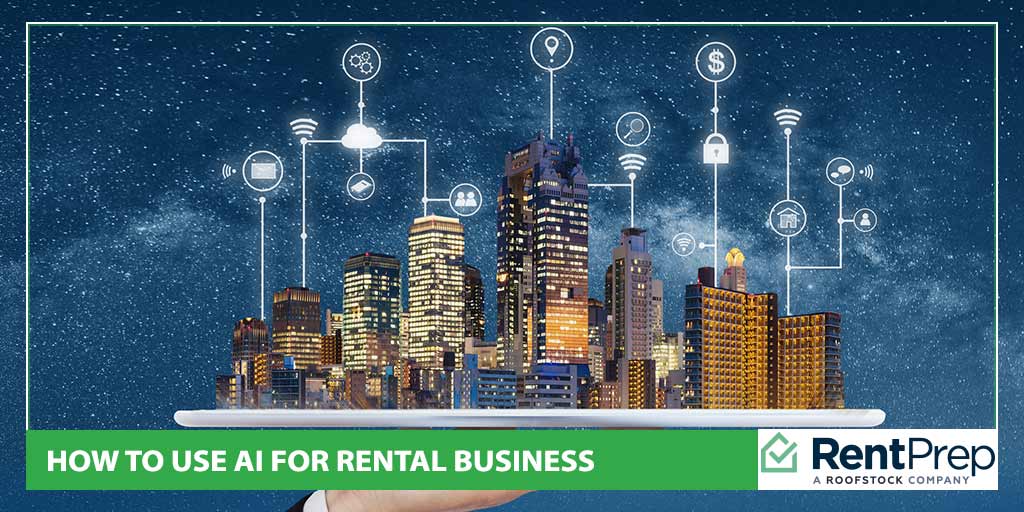
As a landlord, you know how much you have to juggle to manage your rental property. You deal with marketing, screening, leasing, maintenance, accounting, and more. And you have to do it all while keeping your tenants happy and vacancy rates low.
Enter the power of artificial intelligence (AI).
AI isn’t just a buzzword or sci-fi fantasy anymore — it’s a reality that’s transforming many industries, including property management. Knowing how to use AI for your rental business can help you with tasks like finding the best tenants, setting the optimal rent, scheduling repairs, and more.
It can also help you save time, money, and resources, allowing you to focus on growing your business and providing value to your tenants.
Today, we’ll show you how AI can be applied in the rental industry, for both big companies with hundreds of units and landlords with just one rental property. We’ll share practical examples of how AI can help you streamline your processes, increase your revenue, and reduce your costs.
Whether you’re new to AI or already familiar with it, you’ll find useful tips and insights on how to use AI for your rental business.
Contents: Using AI In Your Rental Business
Below, we’ll look at a number of AI applications for managing rental properties.
- Data Analysis
- Virtual Assistants
- Tenant Screening
- Content Generation
- Smart Home
- FAQs
- Will You Leverage AI?
Data Analysis

One of the things that AI is really good at is crunching large amounts of data and providing insights based on that data. For smaller rental businesses that don’t have an existing data analyst on the team, this is an incredible resource!
One of the principal uses of large-scale data analysis for most landlords is rent optimization. Analyzing the market, AI can help you determine rental rates for properties like yours in your area, so you can set rates that maximize your income and attract the right tenants. At the same time, you can minimize turnover with tenants moving on as they look for lower rent.
Zillow’s Observed Rent Index (ZORI) collects exactly the kind of data needed for this type of analysis. It looks at current advertised rents along with rents that people are paying and turnover rates for a full analysis.
This kind of data analysis can also fuel predictive analysis, which allows you to deal with potential problems before they happen.
For example, by giving AI access to historical data on pest control complaints and responses for your properties, it may be able to predict pest issues before they happen, particularly when they’re related to seasonal changes or the time between treatments. This means you can take pest management action before you receive a complaint. Similar logic can be applied to repairs, upgrading security features, and more.
Virtual Assistants
As in other markets, timely responses are vital in the rental industry. Renters are usually looking at a number of properties, and if you are sluggish in your responses, good tenants may already be moving forward with another property by the time you engage with them.
Research suggests that 71% of house hunters expect a response within 24 hours of any query, while around 20% expect a response within an hour. Tenants can have similar expectations when it comes to responses to complaints or reports of maintenance needs. Keeping up with this kind of response rate can be hard for a small team.
Again, this is where AI can help. AI can field queries and respond to emails and phone calls using a library of responses. It can also collect contact details and book tours, which it can schedule in a real agent’s calendar based on their availability. There are already virtual leasing assistant AIs out there that do this, such as PERQ and ACE.
Similarly, AI can act as a first respondent to tenant requests, and can rank them based on level of urgency and provide prioritized “to do” lists to real-life agents.
Many people worry that AI will seem impersonal and put off some tenants. It is true that AI has to be implemented well in these situations, but the technology is getting very good, and most people are now used to dealing with AI in the first instance in their contact with most major companies, such as banks.
Hyro.ai is an adaptive communications platform for real estate that can manage chat, email, and telephone conversations. It’s constantly learning based on new information and can learn about your brand voice from your communications.
Tenant Screening

While tenant screening tools such as those provided by RentPrep are a fast and effective way of screening tenants, there are still several steps in the process. When a rental application is received and a fee paid, there are a number of background checks to be run, references to be checked, and some other things to be checked outside of standard reports.
There is AI technology that can help with this process. They can pre-screen tenants based on criteria that you have set using the information provided in their application. Assuming they pass this first hurdle, the AI can then request screening information from various sources when the fee has been paid. This includes submitting data to RentPrep and generating emails to send to previous landlords, requesting references.
The AI can then deliver reports on potential tenants that could rank them using a traffic light system and highlight areas of the application or tenant screening that were identified as red flags. Yes, a human being with knowledge, experience, and decision-making power will still need to review applications, but AI can take a lot of the time and hassle out of the process.
However, be aware that AI has been known to reflect human bias, as it learns from decisions that humans have made in the past. This is why it is so important that a human always has the final say in any tenant decision based on AI to avoid any violations of the Fair Housing Act.
Content Generation
Another area where AI is performing increasingly well is in written content generation. Many people, when shown text produced by a human writer and an AI machine, can’t tell the difference.
Property management companies often need to prepare quite a bit of generic text— for example, providing descriptions of available properties. While the agent may want to write or at least provide detailed information for the property itself, AI tools such as ChatGPT can provide important supporting text such as description of amenities, schools, and transport links in the local area.
When AI is generating lots of content, and also has data to analyze on user response to that content, it can learn and improve text to make it work better for both search engines and human readers. For example, the AI used on short-term rental sites such as Airbnb and VRBO can identify which common elements of descriptions seem to attract tenants and include these in future descriptions of properties.
AI can also be useful when it comes to generating communications that need to be sent to a large group of people, such as when all tenants of an apartment building need to be advised of scheduled repairs. It can personalize communications to be sent to individual tenants.
AI can also monitor your books and flag when rent is overdue or a lease is due to end. It can generate communications to send to tenants reminding them to pay their rent or asking if they intend to renew their lease. Based on responses, AI can generate actions for landlords or agents to close the transaction.
Check out Epique AI as a tool capable of creating property descriptions, generating visuals, and managing email communications. It can also be used to produce Instagram quotes and promote properties via social media.
RealtyNinja can help you create and maintain your real estate website, with property listings and lead capture features.
Smart Homes
Depending on your target rental market, incorporating smart home features into property can attract both interest and higher rents. This can be particularly popular for luxury properties, short- to medium-term rentals, and properties used by workers who stay in the city during the work week and then return home for the weekend.
Many appreciate smart home features such as automated control of the thermostat and automated light fixtures that can deter robberies. There are many smart security features such as doorbell cams and fire alarms that can also be included.
Not only are these attractive features for tenants, but they also offer landlords a non-invasive way to monitor a property. For example, you can receive alerts when fire alarms are triggered or notifications when there seems to have been no activity at the property for an extended period of time.
However, while there are not yet comprehensive laws in place to dictate how landlords can use smart technology in their properties, it’s important to stick with the spirit of the existing laws and ensure that you are not violating your tenants’ privacy.
For example, cameras should never be placed in areas where there is an expectation of privacy, such as bathrooms, and arguably tenants have the expectation of privacy throughout their home. It should be clear where cameras are and why they are there. There should be a clear security argument for their placement and strict rules about who can access footage, when, and under what circumstances.
All information about smart home features and how they could be used should be clearly outlined in rental contracts.
While smart home features are currently considered luxury features, they are increasingly becoming the norm. Installing them now can be a way to stay ahead of the market.
AI For Rental Business FAQs
Use of AI is still relatively novel in the real estate field. Here are answers to some of the most frequently asked questions.
Are smart home devices in a rental property worth it?
According to a recent study, more than 75% of renters would be willing to pay more for a home with key smart home amenities, but the increase was modest: around $20 per month. Security based smart tech are most important to renters, such as high-tech door locks.
Is AI-generated content bad?
While many people cannot identify AI-generated content when they read it, AI is still in its infancy and takes most of its learning from the internet. This means that inaccuracies can be rife and content does need to be double-checked for accuracy before being published.
Does Google penalize AI-generated content?
Google has specifically stated that it has no intention of penalizing AI-generated content in its search rankings. While it can identify AI-generated content, the content is not flagged as such, especially since most pages will use a mix of AI and original content. What matters most in search rankings is how well the content on a page matches the search intent.
Will You Leverage AI For Your Rental Business?
There are many ways that AI can be leveraged to streamline processes and improve business outcomes. But when considering the use of AI, the most important thing is always to have a business case for its application and never use technology just for technology’s sake.
For example, there is a clear case for most rental managers to use AI to field queries from interested parties and schedule viewings, and to deal with requests from tenants and create prioritized lists of actions. There is also a clear case for AI to do first looks on tasks such as tenant screening to then be reviewed by human specialists.
For many landlords, there is a less clear business case for installing smart home AI for tenants to use or to monitor the property. This only makes good business sense in certain markets where there is a high demand.
Technology, including AI, should always be a business tool that helps you to achieve specific outcomes.

